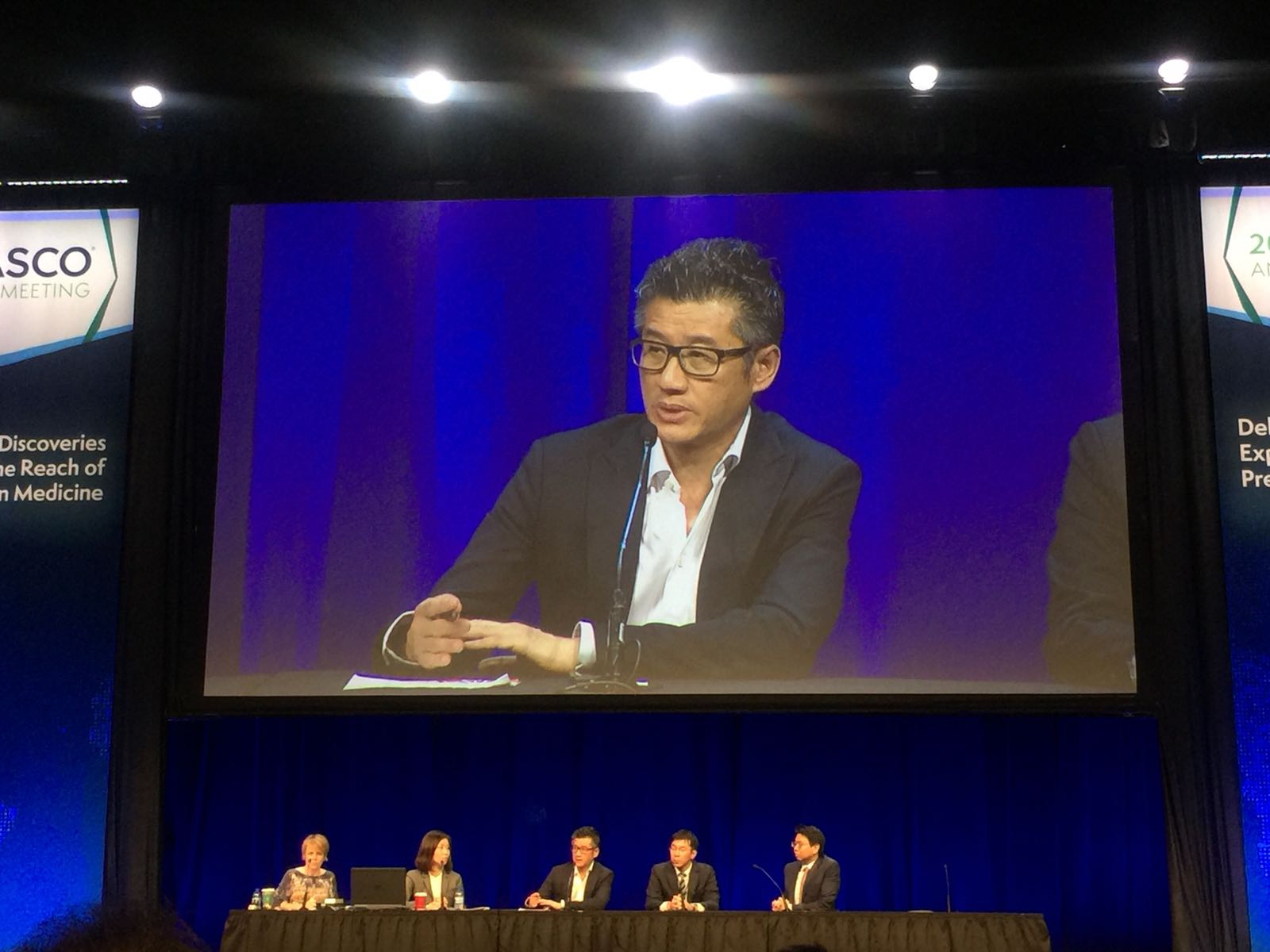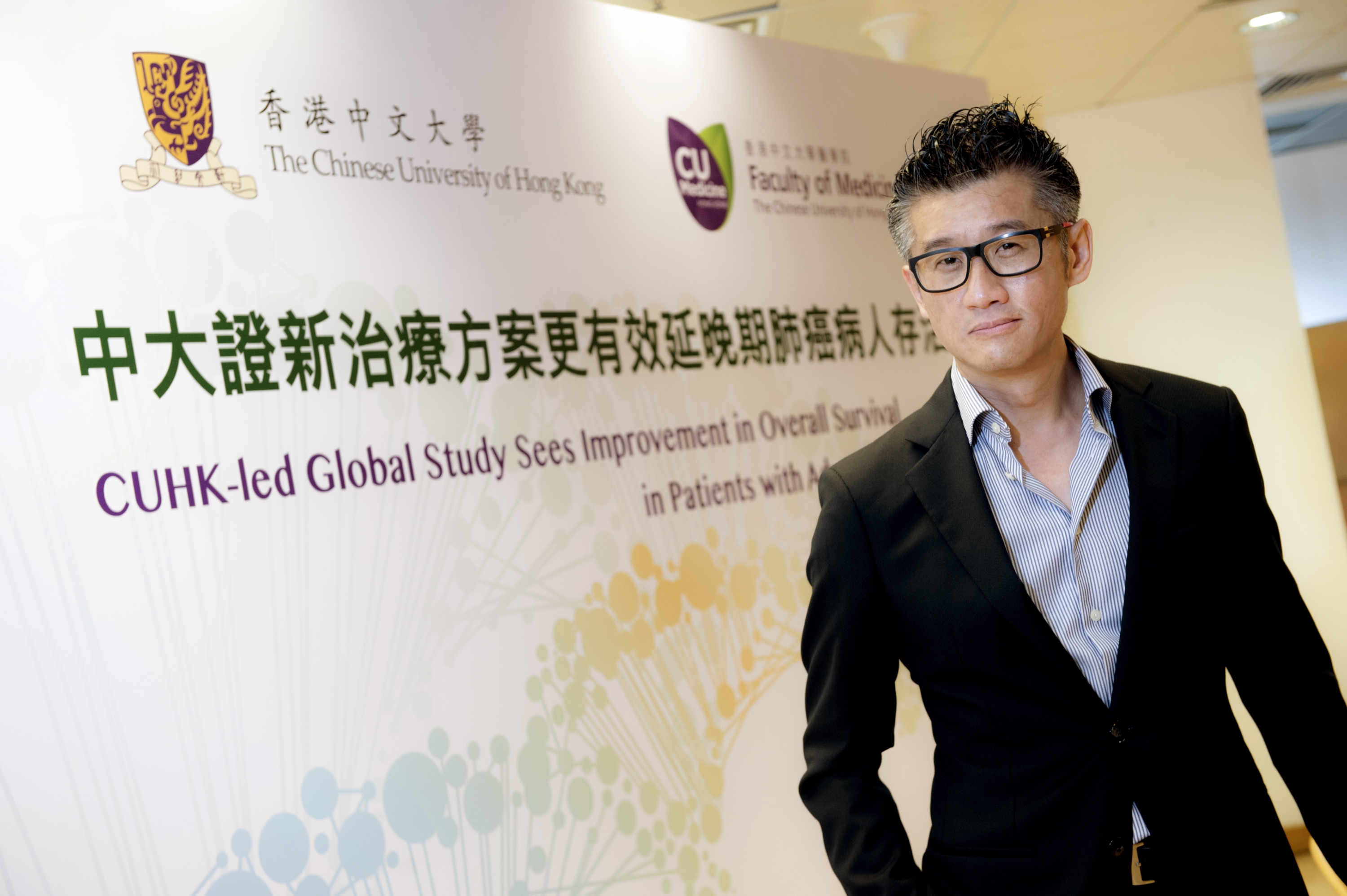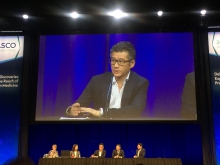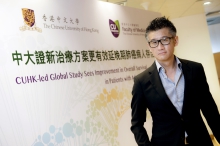CUHK
News Centre
CUHK-led Global Study Sees Improvement in Overall Survival in Patients with Advanced Lung Cancer
A global study led by the Faculty of Medicine of The Chinese University of Hong Kong (CUHK) has revealed that a second generation targeted therapy shows a more than 7-month improvement in the overall survival of advanced non-small-cell lung cancer (NSCLC) patients with epidermal growth factor receptor (EGFR) mutation, compared with conventional first-line treatment. More than half of these patients survived 30 months or more. This Phase 3 clinical trial demonstrates that the new treatment is superior to current treatment and should be considered one of the standard treatment options for these lung cancer patients. The results of the research were just published in the Journal of Clinical Oncology and presented to oncologists worldwide at the 2018 Annual Meeting of the American Society of Clinical Oncology (ASCO), the largest and most influential oncology organisation in the world.
NSCLC accounts for 80% of all lung cancers, while over half of the patients with adenocarcinoma harbour EGFR mutation
Lung cancer is the most common cancer in the world, accounting for 1.6 million deaths every year. In Hong Kong, lung cancer is also the leading cause of cancer deaths and the second most common cancer with over 4,000 new cases per year, in which many of the patients are young female non-smokers.
NSCLC accounts for about 80% of all lung cancers. Adenocarcinoma is the majority of NSCLC and over half of lung cancer patients with adenocarcinoma harbour EGFR mutation.
Professor Tony Shu Kam MOK, Li Shu Fan Medical Foundation Professor of Clinical Oncology and Chairman of the Department of Clinical Oncology of the Faculty of Medicine at CUHK, established the role of first-generation tyrosine kinase inhibitor (TKI) “Gefitinib” as the standard-of-care in patients with EGFR mutation in 2009. With the rapid development of medical science, new generations of lung cancer targeted therapy have been developed in the past decade.
New therapy shows more than 7-month improvement in overall survival
To compare the efficacy and safety of treatment with the second-generation TKI “Dacomitinib” to conventional treatment with “Gefitinib” in patients with advanced NSCLC and EGFR mutation, Professor Tony MOK leads an international randomised phase 3 study named “ARCHER 1050” which involved 71 medical centres and hospitals worldwide.
Previously reported findings from ARCHER 1050 showed that the progression-free survival (PFS) with Dacomitinib is over 1 year, six months longer than conventional treatment.
Results of the recent research have further revealed that the second-generation TKI improves overall survival as first-line treatment in patients with advanced NSCLC harbouring activating EGFR mutations. A total of 452 patients with advanced NSCLC with EGFR mutation were enrolled in the study, of which nearly 80% of them are Asians.
The patients were randomly divided into two groups and assigned to Dacomitinib or Gefitinib. Results show that overall survival in the Dacomitinib group was almost 3 years and there is a 7-month improvement, while the overall survival probabilities at 30 months is also better. Study results are summarized as below:
|
|
Second-generation TKI Dacomitinib |
Conventional TKI Gefitinib |
|
Overall survival(median) |
34 months |
27 months |
|
Overall survival probabilities |
56% |
46% |
|
No. of patient developed brain metastases |
1 |
11 |
In addition, patients in Dacomitinib group who needed chemotherapy as subsequent treatment was 10% lower than that in the Gefitinib group.
Phase 3 Study demonstrates better efficacy and safety than conventional treatment
While presenting the above findings at the 54th ASCO annual meeting held in early June this year, Professor Tony MOK pointed out, “Overall survival is an important measure to assess efficacy of a new cancer treatment. The importance of the study is that it is the first phase 3 randomised clinical study that directly compares two TKIs as first-line treatments and shows an improvement in overall survival. Results show that the new treatment improves both the progression-free survival and overall survival of the patients. I look forward to having the novel targeted therapy as a potential first-line treatment option for NSCLC patients with EGFR mutations.”
Professor Mok added, “Having said that, we should also note the toxicity involved in Dacomitinib. The most common adverse event reported was diarrhoea of which more than 80% of patients experienced. Some patients even had to discontinue due to treatment-related adverse events. After all, we have to watch out on toxicity management in this connection.”
Asia continues to make global impact on lung cancer research
Professor Mok established the role of first-line treatment in patients with EGFR mutation in 2009, later suggesting a new treatment paradigm for patients whose cancer genes further mutate and develop resistance after first-line EGFR targeted therapy in 2016. The latter study was selected as one of the ten most “Notable Articles of 2017” by a top medical journal, the New England Journal of Medicine (NEJM). This shows that the NEJM’s editorial board found his study as one of the most meaningful in improving medical practice and patient care to the world from among all papers it published in 2017.
Furthermore, Professor Mok published a study in 2014 proving that molecular targeted therapy is superior to standard first-line chemotherapy in ALK-positive lung cancer patients. In 2017, he made another study that confirmed a novel targeted therapy improved the progression-free survival when compared with the standard treatment for ALK-positive lung cancer patients, setting the new standard of care for the patients throughout the world.
By understanding the molecular profile of lung cancer, physicians can customise the treatment for patients according to the genetic information of their tumours. This brings personalised medicine development of lung cancer into a new stage and enhances patients’ quality of life.
About American Society of Clinical Oncology
The American Society of Clinical Oncology (ASCO) was founded in 1964. As the world’s leading organization of its kind, ASCO represents nearly 45,000 oncology professionals who care for people living with cancer. Through research, education, and promotion of the highest-quality patient care, ASCO works to conquer cancer and create a world where cancer is prevented or cured, and every survivor is healthy.
ASCO held its 54th annual meeting in Chicago, USA, from 1st to 5th of June in 2018. At the annual meeting, over 30,000 oncology experts around the globe participated to discuss the most advanced treatment options.
A global study led by Professor Tony MOK, Li Shu Fan Medical Foundation Professor of Clinical Oncology and Chairman of the Department of Clinical Oncology of the Faculty of Medicine at CUHK, has revealed that a second generation targeted therapy improves the overall survival of advanced non-small-cell lung cancer (NSCLC) patients with epidermal growth factor receptor (EGFR) mutation. The new treatment should be considered as one of the standard treatment options for these lung cancer patients. Professor MOK presented the study findings at the 54th ASCO annual meeting held in early June this year.







